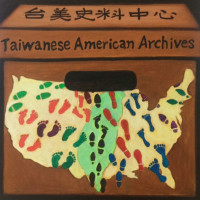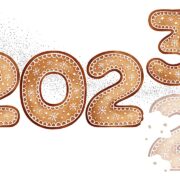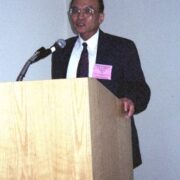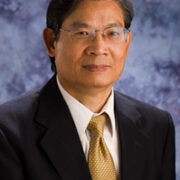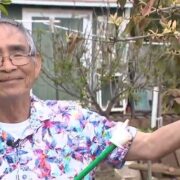Farewell to the Taiwanese Association of America in Houston
Author: Ming Cheng Liau 廖明徵
Editor’s note: Dr. Ming Cheng Liau, now 58 years-old, has been conducting cancer research for over 30 years in Houston, Texas. Ten years ago, Dr. Liau was successful in producing an anti-cancer drug called a cell differentiation agent. In a phase III clinical trial, after the completion of phase II trial, the FDA terminated the trial in 1986 due to the drug not being a single agent.
Dr. Ming Cheng Liau’s theory of “abnormal methyltransferase” carcinogenesis is clearly not compatible with the mainstream American medical theory of “cancer cell division” carcinogenesis, so he is determined to return to Taiwan to continue his research on cell differentiation agents. On March 14th, he left his position as manager of a biochemical research lab at Burzynski in Houston, and on March 29th he returned to Taiwan to serve as director of anti-cancer drug development at Taiwan Biotech Co.
As Taiwan Biotech has a cooperative research plan with a medical university in Anhui province, China, he must reside in China for some time. Though this conflicts with his political leanings, he says his dream is to produce anti-cancer drugs to save patients, and this will not betray his conviction that Taiwan and China are independent nations. He firmly believes Taiwan will eventually become independent.
Dr Liau says, when he returns to Taiwan, he will participate in political movements but has no interest in running for office. Ming Cheng Liau says one day his cancer patients in the US will come to Taiwan to find him.
In all I have been in the US for 30 years – this land has nearly become my primary homeland, for I have spent the longest stretch of time here in all my life’s journeys. But in terms of my sentiments, I am not an assimilated American; my homeland is that small island on the other side of the Pacific called Taiwan. Since my heart is in both places, it is inevitable that on the eve of my departure from the US to go to Taiwan my confused emotions should surge. I have many life-long friends here, after all, as well as my wife who has shared everything with me and my most beloved daughter, my dear mother, and other relatives. Several times in the middle of the night I have been struck with pangs of grief at leaving, and almost gave up my plan to return to Taiwan.
As a person on the political blacklist of the authoritarian Kuomintang (KMT) party, I was restricted from entering Taiwan for 31 years. In the year after the blacklist was lifted, I returned four times, all through invitations to give lectures. I hold a unique position on cancer treatment, and Taiwan welcomes my input. Cancer is a severe problem in Taiwan; owing to environmental pollution from soaring industry, cancer has surged as the number one cause of death now for the tenth year in a row, and there is little we can do about it. Once when I was having a discussion with Taiwanese cancer authority Ruilou Song 宋瑞樓, he told me that many of his patients leave the hospital and go to mainland China for unproven medicines as soon as they find out their diagnosis is cancer, because they have no faith in popular chemotherapy treatments and would rather turn to secret formulae that have not yet been determined to be effective. There is certainly a need to develop an effective non-destruction treatment to replace chemotherapy. The cell differentiation agent I aim to develop has the potential to become just such an ideal anti-cancer treatment.
In medical fields, most people believe that persistent division of cancerous cells is the hallmark of cancer, therefore, their primary treatment goal is to prevent cancerous cells from dividing – this is the core concept of chemotherapy. This kind of chemotherapy has been the exclusive cancer treatment for over 40 years, yet we have not overcome cancer; clearly this is not the most effective treatment. I believe the reason cancer cells divide continuously is due to abnormal methyltransferase, and therefore, that abnormal methyltransferase is the root cause of cancer, while uncontrolled cell division is just a symptom. For any disease, the cause is more crucial than the symptoms. Thus, resolving the cause of a disease is far mor effective a treatment than relieving the symptoms. Chinese medicine has one golden rule: “Prevent before you treat, then treat the root and not the symptom.” That is, the best kind of medicine is prevention of disease. Prevention is especially important for diseases that are difficult to cure, like cancer, cardiovascular disease, and AIDS. The second-best treatment strategy is to resolve the root cause of disease, and treating symptoms is only the last resort. Our last-resort chemotherapy treatment has been battling cancer for 40 years; during this time President Nixon even used his authority to declare war on cancer, yet we have not overcome this disease. It is high time to try out the treatment for the root cause that I have invented.
I mentioned earlier that abnormal methyltransferase is the root cause of cancer. Most people have sufficient chemical compounds in their bodies to prevent the formation of such abnormal methyltransferase, which is also why the development of cancer is an extended process, during which time the patient accelerates the excretion of chemicals that fight cancer in their bodies – it is only when the anti-cancer compounds have reduced to the extent so as they are unable to inhibit abnormal methyltransferase, that cancer cells begin to divide uncontrollably and symptoms appear. All cancerous cells exhibit this kind of pathological change, but normal cells, regardless of whether they are dividing or not, never have this kind of abnormal enzyme. Thus, abnormal methyltransferase is the common alteration of all cancer cells.
Healthy people also excrete small amounts of anti-cancer substances in their urine. After careful refinement, these substances can selectively inhibit abnormal methyltransferase of cancerous cells. As normal enzymes do not have an abnormal factor, the growth and function of normal cells will not be affected by these anti-cancer substances.
Among anti-cancer chemical treatments, this is the only chemical that is selective, and thus patients will not suffer adverse side effects. When abnormal methyltransferase is inhibited by these substances, that is, when the root cause of disease is resolved, the cancer cells will naturally be directed to differentiate and become terminally differentiated cells that will no longer divide. This kind of therapy can be said to be a selective and natural cure, an anti-cancer mechanism innate to human bodies. This kind of medicine has not yet been approved by the US FDA. I can only go back to Taiwan in search of alternate paths of development where there is perhaps space for innovation.
The reason I came to the US to study was to explore a cure for cancer. I discovered the crux of carcinogenesis, and also found a method to resolve it – perhaps I have reached my goal of coming to the US to study. Yet I am not satisfied. This is because my views on cancer are different from those of mainstream cancer authorities and as such are not recognized. I feel very let down in my academic profession. Yet serving Taiwanese associations has been very fulfilling, I have not wasted my 32 years of life in the US after all.
I came to the US in June 1962 and arranged in advance for my friend Chichao Chang 張持昭to come to pick me up. Unexpectedly, George Chang 張燦鍙 came along as well, and I only then found out George Chang was in Houston as well. We had been classmates at National Taiwan University (NTU) – though we studied in different departments, we shared all of our chemistry classes. Plus, he was a renown student at NTU, a former chair of the Student Association, so I had long known of him. I never thought we would reconvene in the US. This was a momentous coincidental encounter in my life. I lived together with him for years after arriving – as long as we didn’t touch politics we made for amiable roommates. In those three years we lived carefree student lives drinking lots of beer. He was a poor drinker, but our third roommate Heyi Huang 黄和義 was well matched with me. Having one drinking buddyy was enough to lead a happy life. The problem started in 1965. George saw an untruthful report praising Chiang Kai-shek in the Houston Post; he was livid, and submitted a retort accusing Chiang Kai-shek of being a brutal dictator who destroyed the constitution. He wanted me to sign on as a contributor, and wanted us to use our real names and include our address so the contributors would be unmistakable. When I went abroad, the dean of Taipei Medical University Tsiantian Hsu 徐千田had repeatedly called on me to return to Taiwan after my studies to take over the teaching position he guaranteed for me. I was clear as to the fact that once I signed on to this article, I need not even think of returning to Taiwan. But I had never been much of a planner – here was my close friend and roommate of three years – if I didn’t co-sign, who else would? I signed my name, and this one signature made it my fate not to return to Taiwan for 30 years. Last year in November when the blacklist was lifted, I returned home for the first time. Dean Tsiantian Xsu passed away in May of the same year – I didn’t even have a chance to apologize to him. After that one article in 1965, I devoted myself to the Taiwan independence movement and to serving Taiwanese American society.
I was a key coordinator for nearly all the Taiwanese groups in Houston. These groups include the Taiwanese Association of America (台灣同榔會), Texas Taiwanese Federal Credit Union (德州台灣人信用合作社), Houston Taiwanese Professional Association (台灣人專業協會), the Houston branch of the Formosan Association for Public Affairs (FAPA), Taiwan Youth Association (台灣靑少年協會), Houston Taiwanese School of Language and Culture (台灣語文學校), and the Taiwanese Heritage Society of Houston (台灣人傳統基金會). I also actively participated in others such as the Mayflower Magazine (望春風月刊), popular assemblies, the 9th World Federation of Taiwanese Associations (世台會), and summer camps. In demonstrations against the Kuomintang administration, I was always the most fervent participant. I didn’t miss a single one.
The most meaningful time for me serving Taiwanese associations was between 1970 and 1977. I served as chief editor of Mayflower Magazine for nearly two years, conducting the respectable work of instigating Taiwanese consciousness and elevating Taiwanese peoples. At the time the magazine’s publishing relied on widespread participation– it was a lot of work, but fortunately there were many participants so we could keep it up for two years. Another highly meaningful experience was helping my wife Chuchen Kuo 郭珠貞establish the Houston Taiwanese School of Language and Culture in 1985 for educating the next generation of Taiwanese sons and daughters in. My primary motivation for participating in United Formosans for Independence was to be a respectable Taiwanese person. Outstanding nations all over the world value their national image and treasure their inherited culture and traditions, working hard at every aspect to establish a positive image of their nation. We must strive to be among the outstanding nations and work to establish an excellent image for Taiwanese. Education is tough and long-winded work. My wife and I have been doing this heavy work year after year for nine years now. Our goal is to educate the next generation and make them proud to be Taiwanese. Last year, I took over the Taiwanese School of Language and Culture and was especially busy but also especially fulfilled. We had the most students out of any year last year, and our economic situation improved too. I added a math curriculum to meet the needs of the next generation – I had seen a report in a scientific newspaper about how American students were behind Taiwanese and Japanese in math, which gave me the idea to train our students in math. It is a fact that Asians perform better at math than Americans, but the key reason for the discrepancy is that Asian students are more hard working. Asian students face intense pressure to get higher education, and parents put more stress on their children’s education and are always urging their kids on; it is no wonder that Asians perform better in math. Taiwanese children in the US may have mathematical talents, but in an environment that doesn’t require hard work you can’t rely on inherent mathematical talent. Realizing this, I designed a math curriculum to remedy the gap. Indeed, this new class helped recruit many Taiwanese students to our school. Founding the Taiwanese School of Language and Culture was not to make money, but in the year I took over we did have quite a large net surplus and earned the school a respected name.
The purpose behind the Taiwanese Heritage Society, founded in 1991, was primarily to add an activity center for Taiwanese on the Taiwanese language school campus. The Taiwanese in the area warmly welcomed and supported the plan – we raised enough on our first round of fundraising to build the center. It was a grand thing and great boon to Taiwanese groups to construct this activity center; it was of great help to the processes and development of Taiwanese society.
It’s worth mentioning the year of 1978 when I served as the president of the Taiwanese Association of America for one year; that was the year when President Carter officially recognized the People’s Republic of China, based in Beijing, as the official government of China (and no longer recognized the Republic of China, based in Taiwan). A lot of Chinese people rose up to protest, while I as a representative of the Taiwanese Association of America voiced my support and agreement. Perhaps the news media of the US wanted to draw attention to voices of support, for I frequently appeared in television news then; this gave me many opportunities to explain the Taiwanese movement for independence.
Reflecting on the past, I feel on of the most satisfying events was the Taiwan Night party and concert hosted by my wife. She has a perfect personality, so events hosted by her are all handled perfectly. Thinking back to that moving party and concert still fills me with nostalgia.
The Taiwanese of Houston are truly special; they have kept that classic Taiwanese simplicity and loyalty and know only dedication with no thought for fame or fortune. They authentically carry out the words of President Kennedy: “Ask not what your country can do for you, ask what you can do for your country.” Times are changing. KMT secretary-general Shuide Hsu許水德said himself that the only thing that counts is achieving the goal. Thus, Tonya Harding has become the hero everyone seeks to imitate. Will we too become corrupted utilitarians seeking only personal profit? Certainly not! In Houston we have many mainstay Taiwanese like Yayan Li 李雅彥, Chinru Ye葉錦如, Musheng Wu吳木盛, Shenyi Chuang莊勝義, Chiucheng Lin林秋成, Chungsong Chien簡忠松, Chenglong Tsai蔡正隆, Chengye Chuang莊承業, Chengkuang Kuo郭正光, Chungnan Chiu邱忠男, Chilun Chao趙紀論, Yaochou Cheng鄭耀洲, Hongyan Su蘇宏彥, Tsingnan Ou歐清南, Dingtsai Tsai蔡丁財, Shuyuan Tsai蔡淑媛, Nairong Cheng鄭乃榮, Chunhua Chung莊峻華, and Kunlian Tseng曾昆聯. These people and many others, all have unformidable and incorruptible characters. I will always cherish the Taiwanese of Houston.
Source: Taiwan Tribune 03/30/1994
Translated from: 460. 告別休士頓台灣同鄉 / 廖明徵 /09/2016 by T.A. Archives
Posted 2/6/2021

